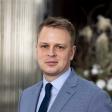Medicine
The aim of the programme is to prepare academically educated and professionally qualified doctors, who can provide the community with a high level of modern medical care.
This programme is also offered in Latvian.
Programme Fact File
Health Care
accredited until
Medical Doctor (MD)
Why study medicine in Latvia? Our Medicine programme is specifically designed to teach students the core competencies that are required in order to become highly skilled doctors who, upon graduation, are capable of pursuing a wide variety of careers.
Student cooperation and their active engagement in group work characterises the programme. The studies involve working on a series of patient-centred problems that reveal the basic principles influencing human health and disease. Students gain medical knowledge and practical clinical skills through the opportunity to work with patients from the 3rd year onwards.
The Faculty of Medicine offers a professional education and the opportunity to study medicine under the guidance of professors from Latvian universities and hospitals, as well as from abroad. As a student in this programme, you will acquire up-to-date knowledge and skills, which are competitive in Europe and the rest of the world.
Study environment and methods
The study programme is based on the concept that a doctor is a trained medical practitioner who acts directly or indirectly on human beings through scientifically based medical activities. A doctor's professional activities include prevention, diagnosis, treatment, and medical rehabilitation, the assessment of diseases and the functional limitations these can cause.
The study process includes placements in clinical patient care, internal medicine, surgery, and obstetrics and gynaecology that supplements theoretical knowledge with practical skills. Simulation-based medical education is implemented at the Medical Education Technology Centre (METC), using modern multi-level simulations to improve practical skills in both individual and team scenarios.
RSU graduates and lecturers at the Faculty of Medicine include people who are successfully working in both Latvian and foreign clinics, at research institutes and international health organisations.
The departments of the Faculty of Medicine coordinate learning in all clinical and theoretical medical disciplines. In cooperation with universities and research institutes of other countries, the faculty departments have become scientific schools and research centres, which ensures the professional quality of teaching staff at RSU.
Study environment
Studies take place in suitable lecture halls, classrooms, laboratories, hospital wards, and study centres. During their studies, students are given free access to a variety of e-resources such as e-books, videos, scientific databases, and other international e-resources.
Students can use the RSU Library, which has been classified as a library of national importance. It provides a unique range of medical literature.
The RSU METC is the only simulation centre in Latvia and the largest in the Baltics. It has the appropriate infrastructure and equipment to ensure that students can acquire and improve their skills, and the centre can implement simulation programmes in various healthcare sectors.
Starting from the 4th semester, theoretical and practical classes take place in well-equipped classrooms at the largest hospitals in Riga.
Some students spend one year of their studies in another European Union country through the Erasmus+ programme. Some of the study courses can be acquired in leading foreign hospitals of the student's own choice. Many Latvian students also voluntarily choose to continue their studies in international groups.
The study programme is comprised of compulsory and elective courses.
- Basic subjects (years 1 to 2)
You will acquire basic medical disciplines. It is important to have a general theoretical knowledge base on which to model an understanding of the human body and its normal functioning. The contents comprise several disciplines from different fields of science (anatomy, histology, embryology, molecular biology, physiology, medical chemistry and biochemistry), as well as the humanities (philosophy, psychology, languages).
- Preclinical subjects (year 3)
You will acquire medical disciplines related to pathological conditions and processes, as well as introduction to basic clinical disciplines. The aim is to develop an in-depth understanding of the human body and its functioning in pathological conditions and to develop skills to examine these abnormal conditions. The contents comprise subjects that will broaden the perspective on diagnosis and investigating diseases: pathology, radiology, pharmacology, introduction to clinical medicine, genetics, basics of clinical care, basics of rehabilitation, clinical microbiology, and general surgery.
- Clinical subjects (years 4 to 5)
You will acquire clinical disciplines. During this period, studies mainly take place in medical institutions in a real clinical setting. Here you will gain theoretical knowledge and practical skills on working with patients in almost all fields of medicine. At the same time, you will be improving your practical skills through simulations at the RSU METC.
- Year 6
A clinical-practical study year in which you will spend three placement rotation cycles at medical institutions in internal diseases, invasive medicine, and a subject of your free choice. This will prepare you for general medical practice under the guidance of qualified specialists, as well as for continuing medical studies in residency where it is important to choose a speciality that is interesting and suitable to you. At the end of your studies, you will have to defend your research work and pass the national examination.
Study methods
For more information on the Latvian education system, please see the homepage of the Academic Information Centre.
- Syllabus
Admissions requirements
Study bases
- Pauls Stradiņš Clinical University Hospital
- Riga East Clinical University Hospital
- Other major health care institutions in Latvia
Career opportunities following studies
Upon a successful completion of the six year undergraduate course you will receive your Medical Doctor (MD) degree, which is a primary medical qualification. The MD degree entitles you to continue your professional and academic growth in residency programmes in Latvia, as well as in other countries to train to become a doctor/specialist.
Our graduates have successfully continued their education and professional pursuits in the UK and other EU/EEA member states, as well as in the US (passing, e.g., the ECFMG exams), Australia, Sri Lanka, India, Lebanon, Syria, Israel, Jordan etc. Each country has its own requirements for foreign medical graduates before they can start practicing medicine, or even continue their education in residency programmes, therefore make sure you check the requirements with your country's Medical Council.
The 6-year programme also grants access to doctoral degree programmes.
* A diploma is a document that attests that you have fulfilled all the requirements of the programme, and it is issued along with a Diploma Supplement, which includes information on the content of your studies as well as your academic performance.
Additional information on accreditation
There is no centralised EU accreditation for Universities in Europe. The Universities, including Rīga Stradiņš University, are accredited locally by the Ministry of Education and Science with international experts present. RSU study programmes receive official accreditation every 6 years. In addition, all RSU study programmes in regulated professions, including Medicine and Dentistry, are developed according to EU directives on regulated professions.
Secondly, given that Latvia has been an EU member state since 2004, The Convention on the Recognition of Qualifications concerning Higher Education in the European Region, usually referred to as the Lisbon Convention, applies also to Latvian universities, including RSU. Beside many others, the main point of the Lisbon Convention is as follows: holders of qualifications issued in one EU member state shall have adequate access to an assessment of these qualifications in another EU member state.
EC Directives to be considered are as follows:
- Medicine and Dentistry: Directive 2005/36/EC of the European Parliament and of the Council of 7 September 2005 on the recognition of professional qualifications
- Also this: Notification of evidence of formal qualifications — Directive 2005/36/EC on recognition of professional qualifications (Annex V) (2012/C 244/01)
In short, the Lisbon Convention, and the fact that RSU is an officially accredited state University, ensures that qualifications obtained at Rīga Stradiņš University are recognised in all EU and EEA member states.
Further studies
To become a certified doctor you may continue your studies in the Residency in Medicine programme, choosing the profession that suits you.
Studies may be continued in the RSU Master's and Doctoral programmes (Rehabilitation, Public Health, Health Management only availble in English, Doctoral studies are available in Latvian only):
Head of Programme
 rsu [pts] lv
rsu [pts] lvTeaching Staff
Contact Information
International Admissions Office
Fri 9:00–16:00




